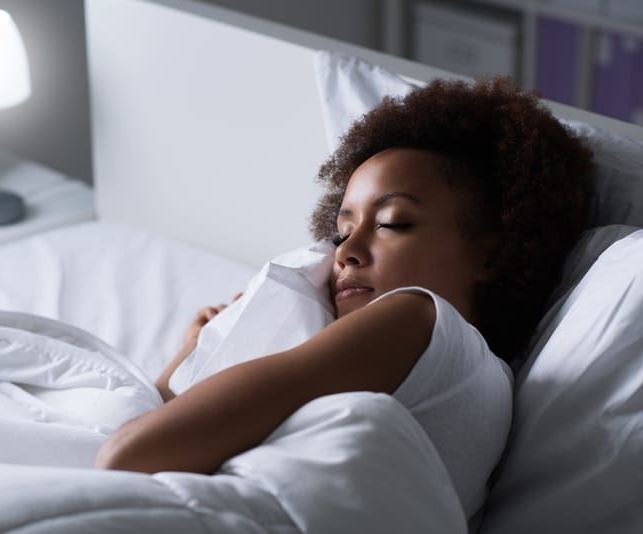"As a society, we are 24/7 and driven by productivity. Our culture just doesn't want to go to sleep."
That's potentially devastating to our health, says Amerlon Enriquez, MD, a Pulmonary and Critical Care and Sleep Medicine physician with The Iowa Clinic.
According to the Centers for Disease Control and Prevention, up to 31 percent of adults in Polk County are sleep deprived, meaning they're getting less than seven hours of sleep per night. And that sleep is being decimated by our overworked, overstimulated, high-tech culture.
Dr. Enriquez believes once people understand how important sleep is to the body and brain, they'll make getting eight hours of sleep each night a priority. And that starts by dispelling several common falsehoods about sleep.
Myth #1: Sleep deprivation only affects sleep — not the rest of your health.
There's a growing amount of medical evidence that shows the opposite. Not getting your ZZZs can cause obesity, Alzheimer's disease, mental illness, depression, diabetes, cardiovascular disease and possibly even cancer.
"Nearly 30 percent of Americans sleep less than six hours. That can increase your risk of early death up to 12 percent."
— Amerlon Enriquez, MD, The Iowa Clinic
"When you don't get enough sleep, your body releases a hormone that makes you feel hungry or not satisfied, so you're likely to eat more. When this happens day after day it can lead to obesity," says Dr. Enriquez. “Lack of sleep also causes insulin-resistance, which can lead to diabetes, and many mental illnesses include sleep problems.”
Myth #2: Naptime disrupts bedtime.
Naps can be a part of a healthy sleep routine. Short naps lasting 15 to 30 minutes are good for you. Just make sure to stick to that cat nap. Anything lasting more than half an hour produces a deeper level of sleep that is more difficult to wake up from. And that can leave you feeling groggy and make it harder to fall asleep come bedtime.
"Our normal circadian rhythm causes a dip in energy every afternoon sometime between noon and 3:00 pm. A short nap, research shows, can improve functionality," Dr. Enriquez says.
Myth #3: You have more important things to do than sleep.
You might have a pressing to-do list. But it shouldn't get in the way of your sleep. Adequate sleep actually benefits your mental sharpness and mood, providing you with the energy to be more productive during the day.
Sleep is also good for your immune system. It helps you fight bugs like the common cold so that unexpected illnesses don't sap your productivity.
"In the 19th century, people slept nine or 10 hours a night. Now we average just six or seven hours a night," says Dr. Enriquez. "We have developed this thinking that sleeping is a waste of time when that's not true."
Myth #4: You can run on less than seven hours of sleep and be just fine.
You hear stories about high-level business executives — some of the most successful people in the world — only sleeping four to six hours a night. Maybe you're a night owl who keeps a similar schedule.
That's not a recipe for success for most people. Experts agree that nearly everyone needs between seven and nine hours of sleep per night.
"Some people may function well with fewer than seven hours of sleep, but that's not the norm," says Dr. Enriquez. "That said, studies indicate that nearly 30 percent of Americans sleep less than six hours. That can increase your risk of early death up to 12 percent."
Myth #5: Sleeping in on the weekends helps you catch up.
It's called "banking sleep." You deprive yourself throughout the work week and catch up on the weekends. It actually leads to a cycle of sleep deprivation.
The problem is that sleeping in on Saturday and Sunday morning usually causes you to lie awake later on that night. Come Monday morning, you're apt to start the week with a sleep deficit.
"When you sleep deprive yourself, your sleep debt increases each day. You need to pay it back within the next day or so, not delay to the weekend," says Dr. Enriquez.
Myth #6: Driving when tired is okay as long as you drink plenty of caffeine.
Drowsy driving is the equivalent of drunk driving. In fact, it's an even bigger problem on the road — fatigue is the No. 1 cause of high-severity car accidents.
Although caffeine can help fight fatigue, it takes at least 30 minutes before it takes effect.
"If you're awake for 17 or 18 hours straight, your reflexes are so slow it's as if your blood alcohol level were .05 percent. You're as good as drunk," says Dr. Enriquez.
And if you've been awake for a full 24 hours, the effect is doubled. So drink your morning coffee with enough time for it to kick in before your morning commute. When you're driving long distances, switch seats with a passenger or pull over at a rest stop for a quick nap if your eyelids get heavy, the car is drifting, you have trouble focusing or you can't remember the last few miles.
Myth #7: Teenagers sleep too much.
Late nights, late mornings. If it seems like your teen keeps odd hours or sleeps too much, it's through no fault of their own. It's biological, says Dr. Enriquez.
"Teens' circadian rhythms are delayed a bit. They don't usually feel sleepy until midnight or later, but then they don't want to get up in the morning. That's not a problem until they need to follow society's schedule for school or work," he says.
To help teens achieve wakefulness in the morning, which helps them fall asleep earlier at night, Enriquez recommends sunlight or light therapy. This helps reset their circadian rhythm to be more alert earlier in the day.
Myth #8: You can adjust your sleep schedule to work the night shift.
"No one really gets used to shift work," Dr. Enriquez says. "Humans are diurnal creatures, meaning they are wired to be active in the daytime."
But in our round-the-clock society, someone has to work the graveyard shift. For those who do, these tactics will help improve the quality and duration of sleep:
- Avoid the light during the day. When you leave work in the morning, try to avoid light, which stimulates wakefulness. Put dark sunglasses on.
- But keep the lights at night. Make sure you're exposed to light throughout your shift and that your work area is well-lit.
- Create an environment for sleep. In addition to sunlight, daytime has more disruptions. Follow the same healthy sleep routine you'd establish at night. Make sure your bedroom is cool, dark and comfortable. Turn off your phone and avoid screens. Practice relaxation techniques to fall asleep quickly.
- Take a nap. Use your "lunch break" or other break times for a quick nap. Just 15 minutes can leave you feeling wakeful and recharged.
Myth #9: You have to live with your current sleep habits.
With the pressures and distractions of modern life, many people feel that a lack of sleep is normal. Or your poor-quality sleep is just a stage and someday — when the baby's older, after the kids are gone, when work settles down — you'll start sleeping better.
"Poor sleep habits can be very hard to break, but they can be broken," says Dr. Enriquez.
Sleep aids and products are a $28 billion industry, and you may find a number of things promising to help you sleep soundly for seven hours or more. But before spending your money on something with little evidence to show its effectiveness, schedule a consultation with a sleep expert at West Lakes Sleep Center.


.jpg)